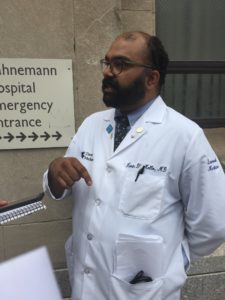As Hahnemann closes, Philly’s middle-wage job sector will take a hit
 August 9, 2019
Category: Featured, Long, Purpose
August 9, 2019
Category: Featured, Long, Purpose
Disclosures
Full disclosure: Lynette Hazelton is an employee of District 1199C Training and Upgrading Fund.In the broiling July heat as she marched around the doomed Hahnemann University Hospital in an effort save it, Debbie Dumas recalled her job history.
“I started here in 1984. It was a nonprofit then and it was the best place of care. It was a wonderful place to work.” She started there when she was 19and never left. Thirty-five years and five children later, she was working as an administrative assistant when word came down that Hahnemann was closing – this time for good. It had been a good job, in a good place, and it provided for a good life.
That’s what Dumas was marching to save on that hot, angry day, as speaker after speaker hurled epithets at the evils of greedy, for-profit healthcare. She was clinging to the hope of a miracle on Broad Street. “Faith doesn’t die,” she said.
Unfortunately, good-paying jobs do.
When Philadelphia Academic Health System, a subsidiary of American Academic Health Systems, shuttered Hahnemann University Hospital, 2,500 jobs evaporated. Not only were doctors and nurses affected — but hundreds of middle-class support staff employees —transporters, medical techs, lab workers, billing clerks, administrative assistants, housekeepers and food service workers. Most of these workers now face future job opportunities that offer lower pay, poorer pensions, part-time hours and fewer benefits.
Because healthcare drives Philadelphia employment, what happens with healthcare employment impacts the city’s economics. One out of every five Philadelphian (as compared to one in nine people nationally) are employed in healthcare. Hospitals sit at the top of the employer food chain, especially for low and middle skills workers, because they provide stable jobs paying family sustaining wages for those with less than a bachelor’s degree.
Pennsylvania is one of six states in the country hard hit by hospital closures. In Philadelphia, hospital shutdowns started with Philadelphia General Hospital (PGH), a West Philadelphia facility for indigent care, which closed its doors in 1977. At first, recalled Donna Ford, a retired executive vice president for National Union of Hospital & Health Care Employees, District 1199C, workers were able to easily find a comparable job with other hospitals.
Over the next 40 years as more hospitals closed — such as Medical College of Philadelphia, Graduate Hospital, Metropolitan Hospital — comparable-paying jobs for support staff became harder to find. In July, at a job fair for Hahnemann workers, support staff’s mood was pessimistic that they would be able to find jobs paying the $20-$30 per hour to which they were accustomed.
A 2014 study on Philadelphia’s middle class by Pew Charitable Trusts showed profound changes over the past 40 years. Between 1970 and 2010, while Philadelphia’s overall population decreased 22 percent, the number of middle-class adults dropped by 43 percent and the number of low wage-earning folks increased by 24 percent.
Dumas said things didn’t get bad at Hahnemann until Allegheny Health, Education and Research Foundation purchased it in 1993. “It was a total disgrace,” she said. Five years later, when AHERF filed bankruptcy, Hahnemann was $1.3 billion in debt with 65,000 creditors making it the nation’s largest nonprofit bankruptcy at the time.
Tenet Healthcare Corp. stepped in and purchased eight hospitals, including Hahnemann and St. Christopher’s Hospital for Children. By 2011, Hahnemann was the second highest grossing for-profit hospital in America with $3 billion in patient revenue.
However, in 2017, Tenet sold Hahnemann and St. Christopher’s Hospital for Children, their last two hospitals in the Philadelphia market, for $170 million to Philadelphia Academic Health, a newly formed affiliate of Paladin Healthcare, a private equity firm.
Of Paladin CEO Joel Freeman, Dumas fumed, “If all he was going to do was shut has down a year and a half later, why buy us out?”
Like Dumas, Dr. Kevin D’Mello, a Hahnemann hospitalist, told the crowd at the July rally that the answer is to somehow thwart for-profit ownership. He told the crowd that the city needed a “People’s Hospital” of safety-net hospitals.
But in 2018 Moody’s Investors Service issued a negative outlook on the nonprofit hospital sector for 2019. Like the manufacturing sector before it, the future of hospitals as an engine for job growth for lower skilled and middle skilled workers seems to be behind us.
About six months before Hahnemann declared bankruptcy, Stephen Klasko, president of Thomas Jefferson University and CEO of Jefferson Health, was at the World Economic Forum and following a panel discussion on the future of the hospital he reported his takeaways.
“If we fail to embrace disruption, the consequences of clinging to legacy systems of care will become even greater,” he wrote, “further growing a fragmented, expensive, inequitable health delivery system. The U.S. has strung together popsicle-stick-and-glue federal policies that continue to graft Star Trek-level medicine onto a Fred Flintstone delivery platform. It’s not working for us, and it won’t work globally.”
What’s the sound of a hospital closing? It is the sound of hundreds falling out of the middle class.
Hahnemann University Hospital will close it doors right after Labor Day.
Trending News










